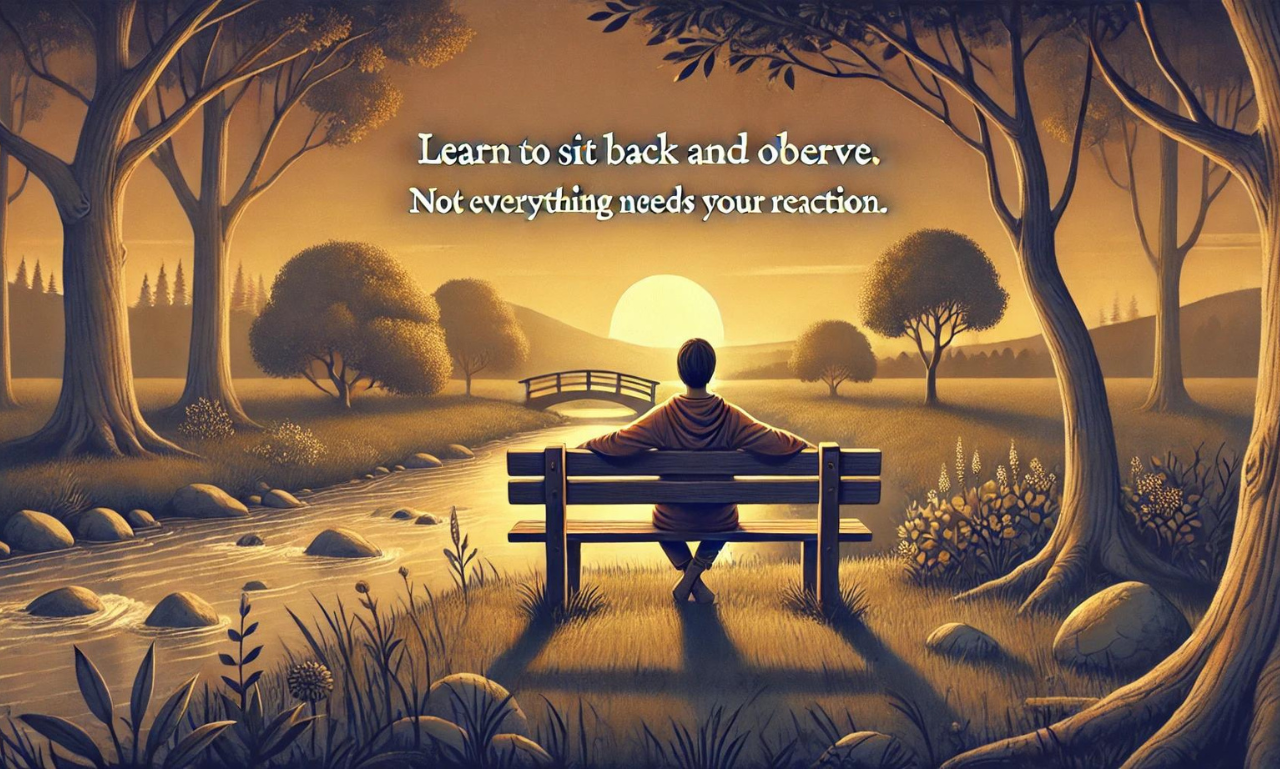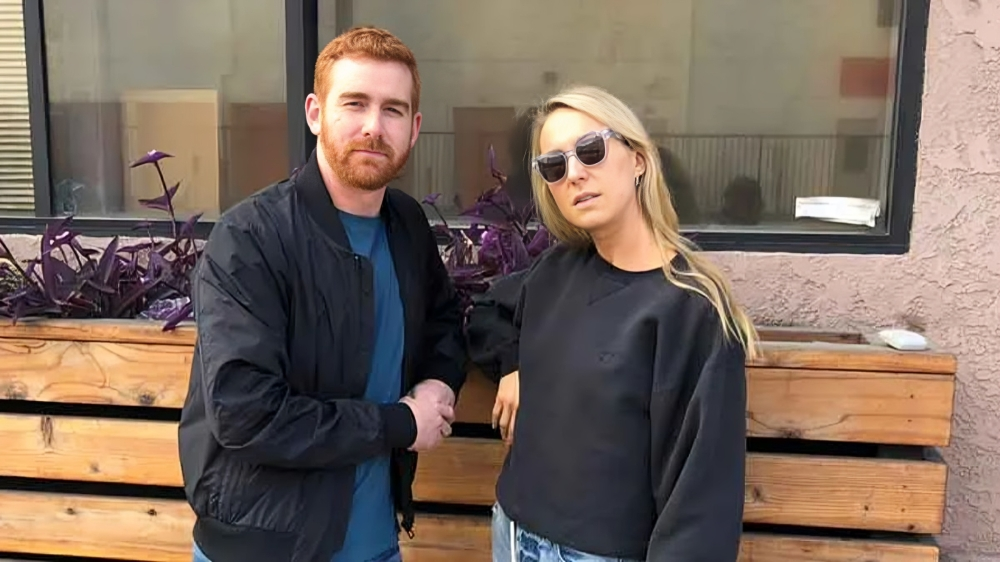Table of Contents
In today’s fast-paced world, reacting to everything that happens around us has become second nature. We see something that sparks our emotions, and our immediate instinct is to respond. This constant cycle of action and reaction can drain our mental energy and cloud our judgment. But what if we adopted a different approach? What if, instead of reacting to everything, we learned to sit back and observe? As Tymoff’s insightful quote says, “Learn to sit back and observe. Not everything needs your reaction.“
This wisdom encourages a shift in perspective, one that could lead to more mindful living, better decision-making, and overall peace of mind. In this blog post, we will dive deeper into this powerful message, explore its implications in our everyday lives, and understand how adopting this approach can positively impact our personal and professional relationships.
Why We Feel the Urge to React to Everything

Human beings are hardwired to react. Evolution has equipped us with instincts that help us survive, and a key part of that survival mechanism is our ability to respond quickly to threats. However, in modern life, most of the things we face are not life-threatening, yet we still feel the urge to react.
The rise of social media has exacerbated this. We are constantly bombarded with information, opinions, and events happening around the world. It often feels like we need to have an opinion on everything and respond immediately. Whether it’s a controversial post on Twitter or a heated discussion among friends, there’s a tendency to feel like we must contribute our voice.
But, as Tymoff suggests, not everything needs a reaction. Often, it is more beneficial to take a step back, observe the situation, and give ourselves the space to respond, if at all, in a more thoughtful and measured way.
The Power of Observation Over Reaction
When you choose to sit back and observe, you are actively practicing mindfulness. Observation allows you to detach emotionally from the situation and see things from a clearer, more objective perspective. This can be particularly valuable in emotionally charged situations where reacting impulsively could lead to negative outcomes.
For example, let’s say you are in a heated argument with someone close to you. Your immediate reaction might be to defend yourself or lash out, but this often escalates the conflict. If, instead, you choose to sit back and observe what is really happening – both within yourself and the other person – you may notice underlying emotions or triggers that are driving the confrontation. This awareness can help you respond in a more constructive and empathetic manner.
Observing before reacting doesn’t mean ignoring the situation or suppressing your feelings. It simply means giving yourself the time and mental space to process your emotions, understand the context, and decide on the best course of action.
Why Not Everything Deserves Your Reaction
In our increasingly connected world, we are exposed to countless events, opinions, and situations on a daily basis. It’s easy to feel overwhelmed and pressured to engage with everything that comes your way. But the truth is, not everything deserves your reaction.
Some things are simply beyond your control. Trying to control or influence situations that are outside of your power only leads to frustration and stress. Learning to sit back and observe allows you to conserve your energy for the things that truly matter. It’s a practice in discernment – understanding what is worthy of your attention and what isn’t.
Here are a few reasons why not everything needs your reaction:
- Energy Conservation: Constantly reacting to everything around you drains your energy. By observing and picking your battles, you can focus your energy on things that are truly important and deserving of your attention.
- Emotional Clarity: When you react impulsively, emotions often cloud your judgment. Taking the time to observe allows you to gain emotional clarity, which leads to more thoughtful and effective responses.
- Avoiding Regret: How often have you reacted to something in the heat of the moment, only to regret it later? By sitting back and observing, you can avoid making rash decisions that you might later wish you hadn’t made.
- Inner Peace: Constantly engaging in every conflict or conversation can disrupt your inner peace. Learning to observe without reacting helps you maintain a sense of calm and tranquility, even in the midst of chaos.
The Role of Patience in Observation

Patience is an essential element of the practice of sitting back and observing. When we are patient, we give ourselves the space to see the full picture and understand situations in their entirety. This patience helps prevent us from jumping to conclusions or making hasty decisions based on incomplete information.
For example, think about how you handle difficult situations at work. When a colleague does something that frustrates you, your immediate reaction might be to confront them or escalate the issue. But if you take a step back, observe the situation, and exercise patience, you might realize that there are external factors influencing their behavior that you weren’t initially aware of.
Patience also fosters empathy. When you sit back and observe, you are more likely to understand the perspectives of others, which can lead to more harmonious interactions and a greater sense of understanding.
How to Practice “Sit Back and Observe” in Daily Life
Adopting Tymoff’s principle of sitting back and observing takes practice. Here are some practical steps to help you integrate this approach into your daily life:
- Pause Before Reacting: The next time you feel the urge to react immediately, whether in a conversation, on social media, or at work, take a deep breath and pause. Give yourself a few moments to process what is happening before deciding how, or if, you want to respond.
- Ask Yourself, “Is This Worth My Energy?” Before reacting, ask yourself if the situation is truly worth your time and energy. If it’s not something that directly impacts your life or well-being, it might be best to let it go.
- Practice Mindful Observation: Try to observe situations objectively, without letting your emotions take control. This could be as simple as listening to someone’s point of view without immediately forming a rebuttal, or watching how events unfold before making a judgment.
- Reflect on Your Reactions: After an event has passed, reflect on how you handled it. Did you react impulsively, or did you take the time to observe and respond thoughtfully? Learning from past experiences can help you improve in future situations.
- Embrace Silence: Sometimes, the best reaction is no reaction at all. Embracing silence in certain situations can speak volumes. It allows you to retain your power, maintain your composure, and avoid unnecessary conflict.
The Long-Term Benefits of Sitting Back and Observing
Over time, learning to sit back and observe can lead to a number of long-term benefits, both for your mental well-being and your relationships with others.
- Increased Self-Awareness: When you take the time to observe your own reactions, you become more self-aware. This awareness helps you understand your own triggers and emotional patterns, allowing you to make more conscious choices about how to respond.
- Stronger Relationships: By observing instead of reacting impulsively, you create space for more meaningful and empathetic communication. This can strengthen your relationships with others, as they will feel heard and understood rather than attacked or dismissed.
- Greater Resilience: Life is full of challenges and stressful situations. By learning to sit back and observe, you build emotional resilience. You become better equipped to handle adversity without being overwhelmed by it.
- Inner Peace and Contentment: Ultimately, the practice of observation leads to a greater sense of inner peace. You no longer feel the need to react to every external stimulus, and this allows you to live a more balanced and contented life.
Conclusion
learn to sit back and observe. not everything need – tymoff
The advice to “learn to sit back and observe. Not everything needs your reaction” is more than just a piece of wisdom – it’s a lifestyle choice that can significantly improve your mental well-being and relationships. By choosing to observe instead of react, you conserve your energy, gain emotional clarity, and make better decisions. With patience, mindfulness, and practice, you can embrace this approach and experience the long-term benefits of a calmer, more thoughtful life.
FAQs Related to “Learn to Sit Back and Observe: Not Everything Needs Your Reaction – Tymoff”
- What does Tymoff’s quote “Learn to sit back and observe. Not everything needs your reaction” mean?
- This quote suggests that not every situation in life requires an immediate response. Instead of reacting impulsively, it encourages us to take a step back, observe the situation, and thoughtfully decide if and how we want to respond.
- Why is it important to sit back and observe rather than react immediately?
- Sitting back and observing allows you to gain perspective, avoid impulsive reactions, conserve energy, and make better decisions. It helps you approach situations with a clear mind rather than letting emotions dictate your actions.
- How does observing without reacting improve mental health?
- Observing without reacting can reduce stress, anxiety, and frustration by allowing you to detach from situations that don’t require your attention. This leads to better emotional regulation, which improves overall mental well-being.
- What are the benefits of choosing not to react in certain situations?
- Some benefits include conserving energy, avoiding unnecessary conflicts, gaining emotional clarity, improving decision-making, and maintaining inner peace.
- How can sitting back and observing strengthen relationships?
- By sitting back and observing, you allow yourself to understand other people’s perspectives, which leads to better communication and empathy. This strengthens your relationships by promoting understanding and reducing conflict.
- What role does patience play in the practice of observation?
- Patience is key when sitting back and observing. It allows you to take your time before reacting, helping you fully understand situations and make better-informed decisions.
- How can I practice sitting back and observing in my daily life?
- Start by pausing before reacting, asking yourself if the situation is worth your energy, practicing mindfulness, reflecting on your reactions, and embracing silence when needed.
- What are the long-term benefits of adopting this mindset?
- Over time, adopting this mindset leads to increased self-awareness, emotional resilience, stronger relationships, and greater inner peace. You become better equipped to handle challenges calmly and effectively.
- Is it always best to observe rather than react?
- While observation is often beneficial, there are situations where immediate action or reaction is necessary, especially in emergencies or when urgent decisions need to be made. The key is knowing when to react and when to observe.
- How does sitting back and observing lead to inner peace?
- By learning to detach from unnecessary conflicts and reserving your energy for meaningful matters, you maintain emotional balance and calmness, which fosters a deep sense of inner peace.






